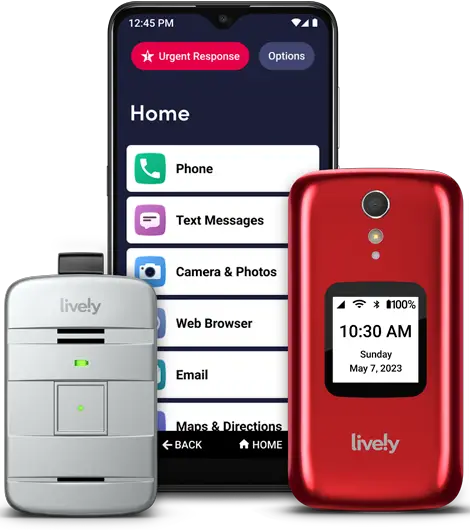This post contains affiliate links.
It’s naturally troubling when you call your elderly parent several times and they don’t pick up the phone. You may find yourself thinking of the worst, which does not make the situation any better. What you need to do is compose yourself and take action.
If your elderly parent does not answer the phone, you can try reaching them through their other means or pay them a visit and personally check in on them. If you are unable to do this, you can call a neighbor to check on them or contact the police to perform a wellness check.
The rest of this article will explain in greater detail what you need to do if your aging parent does not answer the phone. Read on to learn the best course of action for such tense situations.
1. Try To Contact Them Through Another Platform
Some older folks can keep up with technology and know their way around a laptop or desktop computer. Perhaps their former job required the use of a computer, or they learned how to operate one for long-distance communication with loved ones. However, if they’re struggling with modern smartphones, you might consider getting them a Lively Jitterbug phone. These phones are specifically designed for seniors, with large buttons and an easy-to-navigate interface. It could be that they are not answering the phone because they do not hear it ringing. The Jitterbug phone features a loud ringer and can even read out the caller’s name, ensuring your loved ones won’t miss your call.
If your elderly parent has a computer at home, they are likely to have one or more video conferencing software installed. They might have used their computer for a Skype call with you before. If so, you should try contacting them there.
It could be that they are not answering the phone because they do not hear it ringing. Perhaps it was accidentally put on silent mode, or they may have misplaced it and cannot hear it ringing from where it is.
Unlike our generation, elderly parents can go for several hours or even days without looking at a phone screen. If they do not hear it ringing, they do not feel the need to check on it. In this case, it would help if you could get their attention through other means, such as their computer.
2. Call a Neighbor To Check on Them
If you live some distance away from your elderly parents, it is best for their well-being and your peace of mind to have a trusted neighbor you can count on in these situations.
Children of some elderly folks entrust the neighbor with a key to their parent’s home so they can easily check on them when needed.
If you have this sort of arrangement with your parents’ neighbor, you can call them and ask them to drop in on your parents and find out why they are unable to answer your calls. You can also ask the neighbor to check your parent’s phone and ensure the settings are in order.
In some cases, it does not even have to be the next-door neighbor but a friend or relative in the same neighborhood or town. Contact the person you know who lives closest to your parents and request them to pay a visit.
3. Go Over To Their Place and Personally Check on Them
This may not be the easiest thing to do, but if you can make the time and are within reasonable driving distance from your parent’s home, you should check on them personally. Alternatively, you could consider investing in Lively’s medical alert system. With its in-home and on-the-go systems, you can easily check on your parents without being physically present. It even includes a caregiver app, so you can stay informed and connected wherever you are.
If your parents could not answer the phone due to some sort of distress, you will be glad you dropped in and came to their aid. And if, fortunately, all is well and technical issues were the reason they could not pick up, the drive would still be well worth it as you’ll get to spend some quality time together.
You will also be able to better assess your parent’s situation in person than if they had simply picked up the phone and told you how they were doing.
4. Ask the Police To Perform a Wellness Check
You might be living too far away from your parents. Perhaps you are in a different state, and if you do not have another platform to reach them or a neighbor to call, you will understandably feel helpless. But there is one more thing you can do.
Citizens concerned about another individual’s welfare can place a 911 call and request a wellness check. The police department in the jurisdiction will send a law enforcement officer to the address you provide and check on the individual in question.
If the police can ascertain that all is well with your parent, they will report back to you. In the unfortunate circumstance of illness, injury, or death, they can enter the property and immediately take the necessary action.
Wellness checks have saved countless lives. One could very well save your parent’s life and get them the medical assistance they require. If you call your parent several times and they do not pick up, you should probably consider dialing the police, especially if you do not have a contact person nearby.
However, dialing the police should be the last resort, as it’s best done if options like requesting a neighbor or nearby friend to check on your elderly parents are not workable.
5. Get Them a Personal Emergency Response System
In some cases, older adults with mobility problems cannot reach the phone in time before it stops ringing. If your parent has a landline phone, this may be the issue. But the same could also go for a cell phone as they would not likely have the device on their person at all times.

If your elderly parent has difficulty getting up or walking under normal circumstances, they may not be able to reach the phone to call for help if they are in distress. Their best chance is with Lively’s medical alert system. The device can be worn as a pendant or a bracelet and can send an alert to a medical response team and also notify you if your parent has an emergency. This gives you the peace of mind that your parent is safe even when you’re far away. Lively’s medical alert system even includes fall detection technology, ensuring that help will be called even if your parent can’t reach the button.
A personal emergency response system (PERS) is a device that can send an alert to a medical response team and also notify you, among other contacts, if your elderly parent has an emergency. This device should be on the person and is typically in the form of a pendant or a bracelet.
Initially, a person wearing a personal emergency response system had to manually press a button to call for help. But technological advances have seen automated fall detection systems come to the fore.
There are many different kinds of personal emergency response systems. Most have a two-way personal emergency response system that is either unmonitored or monitored by a response center.
In the event of a fall, but the elderly individual is unharmed and able to get up without assistance, they may cancel the alarm by pressing a button on the device or inform the emergency operator of a monitored response system that they are okay.
When you regularly call your elderly parents, they feel appreciated. But how often should you contact them? Click on the link to find the answer. How Often Should You Call Your Elderly Parents?
Tenuto Properties LLC dba Growing Gray USA is a participant in the Amazon Services LLC Associates Program, an affiliate advertising program designed to provide a means for sites to earn advertising fees by advertising and linking to Amazon.com. We also participate in other affiliate programs which compensate us for referring traffic.


